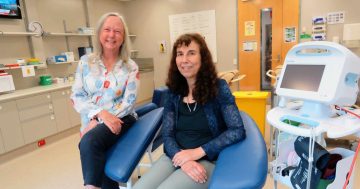Jessie Tu* says new research has shown that women have worse outcomes than men after cardiac bypass surgery, but there’s something that can be done about it.
 Women are significantly less likely than men to undergo coronary artery bypass grafting (CABG) which may result in worse outcomes after surgery.
Women are significantly less likely than men to undergo coronary artery bypass grafting (CABG) which may result in worse outcomes after surgery.
That’s according to Dr Oliver Jawitz, the lead author of a study which he presented at the 57th Annual Meeting of The Society of Thoracic Surgeons held in Austin, Texas over the weekend.
In the presentation, Dr Jawitz said that his findings “highlight key differences between women and men in surgical techniques used for CABG and reveals opportunities to improve outcomes in women.”
Dr Jawitz is a resident surgeon from Duke University in the US and has spent years researching thoracic and cardiac surgery.
He used the STS Adult Cardiac Surgery Database to identify adult patients who underwent isolated coronary artery bypass grafting for the first time between 2011 and 2019 and found that women were between 14 to 22 percent less likely than men to undergo CABG procedures using the current strategies to restore the perfusion to an organ that has suffered a restriction in blood supply to tissues, causing a shortage of oxygen that is needed to keep tissue alive.
According to Dr. Jawitz, current surgical approaches, including grafting of the left internal mammary artery and multiarterial grafting, have been linked to improved short or long-term outcomes.
“With these findings, we did in fact see less aggressive treatment strategies with women,” said Dr. Jawitz.
“It is clear that sex disparities exist in all aspects of care for patients with coronary artery disease (CAD), including diagnosis, referral for treatment, and now, in surgical approaches to CABG.
“We must ensure that female patients undergoing CABG are receiving evidence-based, guideline-concordant techniques.”
The STS Adult Cardiac Surgery Database contains records of nearly all CABG procedures performed in the U.S, and for the study, researchers from Dr. Jawitz’s department, as well as scientists from The Johns Hopkins University School of Medicine studied the clinical and procedural data from more than 1.2 million patients.
Dr Robbin G. Cohen, a medical professor from Keck School of Medicine of the University of Southern California, believes that Dr Jawitz’ study is important, “…especially since it utilised the world’s largest cardiac surgical database to document a difference in surgical strategies between men and women who underwent coronary bypass surgery.”
“Now we need to understand the reasons for this disparity and the implications for both short- and long-term results,” he said.
In his presentation, Dr. Jawitz explained that while there are many reasons contributing to this trend, the under-treatment of coronary artery disease in women is due to a failure to recognise key differences in cardiovascular risk factors and symptoms in women compared with men.
Women are likelier to experience less obvious symptoms of heart disease including nausea, fatigue, back pain, abdominal pain, vomiting, and indigestion.
It is also not uncommon for women to be unaware of chest pain as a potential symptom.
Women also have varying risk factors compared with men, including higher levels of testosterone during the period before menopause, higher levels of hypertension and higher levels of depression and stress.
Historically speaking, women have also had a longer time between the onset of symptoms to time of diagnosis and medical intervention.
Dr. Jawitz believes conversations around the differences in how the disease is presented in women and men need to address the different cardiovascular risk factors and interventions.
“Delayed diagnosis of CAD in women leads to late initiation of key behavioural and pharmacologic interventions for minimising heart disease risk, as well as delayed referral for invasive diagnostic and therapeutic procedures, including surgical revascularization with CABG,” Dr. Jawitz said.
“This often means that by the time female patients undergo these procedures, they have more severe disease than males, as well as a greater number of comorbidities, which leads to worse outcomes.”
It is now common knowledge that worldwide, many clinical trials underrepresent or completely erase women in their research.
“The evidence available for various therapies and interventions is disproportionally based on male cardiovascular biology,” said Dr. Jawitz.
“But as research in this area becomes more robust, data will continue to emerge showing that cardiovascular disease manifests differently by sex.
“Raising awareness will go a long way toward minimising sex differences in CAD outcomes.”
Dr Jawitz hopes that in the future, the guidelines around coronary artery disease will reflect the differences between men and women in the way they manifest and more women will be used in clinical trials.
“Now that we have identified specific differences in surgical approaches to CABG between females and males, we must further elucidate how these differences result in disparate outcomes such as increased mortality, readmissions, and complications,” he said.
“These findings will help inform the development of sex-specific guidelines for the diagnosis and management of cardiovascular disease.
In Australia, heart disease is the number one killer of women, and affects 1 in every 6 Australians.
*Jessie Tu is a journalist with Women’s Agenda. Her new book, A Lonely Girl is a Dangerous Thing, has just been released by Allen & Unwin.
This article first appeared at womensagenda.com.au.




